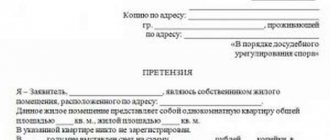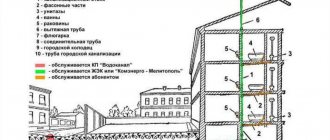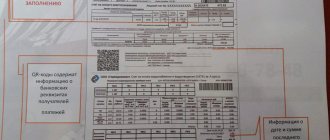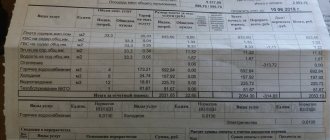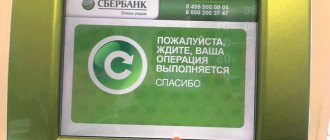How to avoid paying for sewerage
Payment for sewerage is mandatory for all citizens living in Russia, and cancellation is not provided.
However, on April 16, 2013, the Government of the Russian Federation issued Resolution No. 344, according to which the determination of the standard for wastewater disposal for general house needs is canceled. Consequently, now the payment for the removal of water for public use should not be included in the receipt (unless otherwise specified in the agreement with the water utility or management company). Otherwise, consumers have the right to file a lawsuit against the violators and demand a recalculation, taking the volume of consumption according to the meter as a basis.
The concept of wastewater disposal from the point of view of legislation
The need to pay for sewerage, including this concept itself, is determined by government decree No. 354, signed in May 2011 and defining the procedure for providing public services to the population. Read resolution No. 354 .
According to this document, wastewater services involve payment for disposal, collection, delivery of used water to treatment facilities, and cleaning.
Many consumers mistakenly assume that wastewater disposal is an integral part of water supply services. Water disposal involves performing the following operations:
- removal of wastewater along with sewage from the apartment and house;
- removal of wastewater beyond the boundaries of the populated area, with delivery to treatment facilities;
- wastewater treatment with filtration and waste disposal.
The presented list implies that it is not enough to remove the water from the house. It is subject to cleaning and subsequent use.
The funds received for payment for these services are spent by the management company for the following purposes:
- ensuring proper technical condition of sewer systems;
- repair and maintenance of water structures;
- functioning of cleaning complexes;
- disposal of waste generated during wastewater treatment.
To ensure financing of the listed works, a fee is charged to the consumer.
We recommend: How to get a certificate of absence of debt on utility payments
Receipt with an error in favor of the consumer
The consumer may receive receipts with reduced rates if the management company did not take into account one or more residents registered in the apartment. In this case, the receipt will indicate the amount calculated based on the old number of registered residents in the apartment.
An error in the number of registered residents will result in growing debt. In fact, unregistered residents will also use the services, so the accumulated debt will in any case fall on the shoulders of the homeowner.
Sooner or later the error will come to light. The Management Company will establish the fact of an error in the number of registered residents, and then demand compensation for losses from the owner of the property.
The management company has the right to demand payment of the accumulated debt only for the past 3 years.
This means that a homeowner who pays utilities without taking into account one of the registered residents for 5 years is obliged to pay the resulting debt for only 3 years. Accordingly, the management company is obliged to calculate the debt only for 3 years, leaving the remaining 2 years without attention.
If the management company does not agree with this provision, the user has the right to go to court.
Rate this post
How is water allocation calculated in the housing and communal services receipt?
When calculating payment for sewerage, a tariff is used. The tariff differs depending on the region. Every year, tariffs are published in newspapers and on the official websites of management companies. The payment amount is calculated in three ways:
- according to individual accounting devices . If apartments are equipped with meters, readings of cold and hot water use are taken. These indicators are summed up and multiplied by the tariff;
- according to common house meters . The installation of meters has now become mandatory, but many owners still have not installed metering devices. In this case, one of the payment methods is based on the readings of a collective meter. In this case, the data from all installed meters is subtracted from the total readings, the resulting volume is divided by the number of registered residents and multiplied by the tariff;
- Another method of accrual is according to standards . To do this, take the average consumption indicator and multiply it by the number of residents.
It is much easier to independently calculate the payment for sewerage if the apartment has meters, and besides, paying by meters is much more profitable than by tariffs; in some regions they are quite large.
How to pay for sewerage
Like any other utility services, you must pay a fee per calendar month for sewerage to your apartment. The payment deadlines are quite clear. At the end of the reporting period, a receipt is sent to the consumer, indicating the amount due. Rent must be paid by the 20th day of the month following the reporting month.
Otherwise, defaulters who owe money will be subject to penalties in the form of a fine for each day of late payment. Delaying payment will entail consequences, since the water utility will consider that its interests have been violated.
What are the consequences of not paying for sewerage?
Some people unknowingly decide that it is not necessary to pay for something that is not entirely clear. This leads to the fact that the generally small amount increases every month. Naturally, you will not be disconnected from the sewer pipe, but you are unlikely to be happy with the consequences. The management company has the right:
- charge a penalty for non-payment;
- to forcefully collect a debt through court. Most likely, the court will decide to collect the debt. The decision is transferred to the executive service, and then the executors will either describe personal property, the sale of which will cover the amount of the debt, or through the accounting department they will write off wages;
- impose a ban on traveling abroad.
As you can see, failure to pay for sewerage can have quite unpleasant consequences.
What do we pay for?
There is no division in payments for utility services, therefore the total amount is calculated for the consumption of resources and for services, as stated in the “Rules for the provision of housing and communal services for owners and users of premises.” The meaning of the decree is this: even if your apartment does not consume one of the resources, if you turn it off, you will still have to pay. Example: there is no installation of an individual gas meter for a neighbor, but the house is supplied with gas, you pay not only for yourself, but also for your neighbor.
And although consumption shows the same amount of one resource (as much comes in, the same goes out), tariffs for sewerage and water supply are calculated differently
In this case, it does not matter at all that the user does not drain all the incoming water into the sewer; some goes for watering plants, some for drinking, etc. However, with all the seeming injustices of the housing and public utilities sector, we should not forget that the used flows are necessarily sent to treatment facilities, where deep biological treatment is carried out and the user also pays for this
Formation of tariff for drainage
The tariff for water disposal is subject to separate determination in each region, which is carried out by a special authorized body.
- The parameters for calculation are the following indicators:
Climatic features of each specific area. Condition of sewer networks. Condition of water supply networks. Distance for pumping water and waste. Condition and quality of pumping station equipment. The number of citizens consuming this service. Payment for the work of emergency crews responsible for maintaining the condition of the network. Ensuring and monitoring the performance of automated control systems. Payment to water utility workers.
- As an example, several tariffs for wastewater disposal:
Rostov region — 24.26 rubles/cubic meter Moscow region — 23.43 rubles/cubic meter Surgut — 25.44 rubles/cubic meter
Deliberate drainage of water
Housing and communal services have the right to demand payment for intentional drainage of water only in a situation where it was made by the owner of the premises, or the noted situation occurred due to leaks and improper condition of the system in the apartment. Note that it is worth draining the water periodically, but the issue of payment remains open.
According to current standards, owners are obliged to monitor the integrity and safety of their property, and if it is determined that the drain occurred due to the owner’s negligence, he will pay. But if the sewage system is new, and everything is in order in the apartment, then the housing and communal services will pay for the intentional drainage.
If there is a deliberate drain of water by housing and communal services employees, consumers will not pay for it. If the payment slip indicates otherwise, that is, there is an unlawful charge of payment, they have the right to contact law enforcement officers with a complaint against the utility companies.
Tariffing or self-payment
Calculating the receipt column is quite simple: water disposal is equal to the sum of hot water and cold water multiplied by the tariff. For example, the supply of water flows is 20 m3, the tariff is 20 rubles, the total amount is 400 rubles. However, if the payment line shows a total receipt of 20 m3, and a total drainage of 25 m3, this is unacceptable; there is a common deception of public utilities, which can be challenged in court.
Apartment buildings often have a common building meter, which shows the amount of payments, but if it does not exist, the calculation is issued by the housing and communal services through the service provider company. If necessary, you can always install your own meter by first submitting an application for installation of the device. As soon as the permit is issued, the meter is installed, sealed and the amounts due for payment are recalculated. Look at the photo to see what the counter looks like.
What is KPU? This question is often asked by users. KPU is a collective metering device installed in a common household manner. In other words, KPU is a counter that shows how much sewage has been drained over a given period of time. However, the abbreviation KPU is not in any official document; in the lines and columns there is “Common house or common house. utility metering devices." It turns out that the KPU is an invention of the housing and communal services sector and nothing more, especially since the use of abbreviated names of devices in official documents is not allowed unless specified by the rules or an addition to the resolution.
So, the fee calculated for sewerage can be checked independently, and in case of the slightest violations when issuing payments for utility services, you can go to court with the housing and communal services. If there is no meter, the amount is calculated according to standard standards established annually. You can find out the standards either from the management company or on the website of the administration of the city or locality.
And, most importantly: Decree of the Government of the Russian Federation dated April 16, 2013 No. 344, payment for housing and communal services for wastewater consumption has been cancelled. Cancellation date: 06/01/2013. The document “On Amendments to Certain Acts of the Government of the Russian Federation on the Provision of Public Utilities,” therefore, if your housing and communal services do not know about this, it would be useful to remind them of this by attaching a photo or copy of the document.
The article was written based on materials from the sites: domdomoff.ru, fb.ru, realtyinfo.online, 1kvartirka.ru, vodakanazer.ru.
Procedure for calculating payment for waste
Payment for housing and communal services for wastewater disposal involves the use of the following formula:
OV = (OHV + OGV) * Tc
wherein:
- OV – amount of payment for sewerage;
- ОХВ – volume of consumed cold water supply;
- OGV – amount of hot water used;
- Тс – the size of the tariff established for the price of wastewater.
To determine the size of the indicators to be substituted into the formula, you must:
- summarize the readings of cold and hot water meters, this information is substituted into the formula, the unit of measurement is cubic meters;
- clarify the size of the tariff adopted in the region.
The size of the sewerage tariff in the region consists of the complex influence of the following factors:
- the degree of wear and volume of sewer lines, the need for modernization and repair;
- condition of treatment facilities, their equipment;
- other criteria influencing the setting of prices.
It is important to take into account the provision of utility services with workers and repair personnel, the conditions for performing work and other characteristics. The size of the assigned tariffs is regularly revised based on the development of inflation processes. The consumer will be able to find out about the tariff in force in a particular region from the media, by visiting the official website of the local administration or by calling the resource supplier.
If there is no individual meter in the apartment, the amount of resources consumed can be estimated based on the readings of the common building meter, if available. Otherwise, standardized indicators approved in a specific region are taken into account.
But in the absence of an individual meter, the amount of payments for water, including sewerage services, will increase significantly.
How to calculate the cost of a service
How many cubic meters of water a tenant uses in a month is how much he must pay. If ten cubic meters of cold water were used, then the indicator that is in the “Tariff” column must be multiplied by 10. The same with hot water. But how is the calculation for sewerage done?
Both cold and hot water are recycled. When calculating, you should multiply the tariff (sewage) by the total number of cubic meters consumed. That is, if eight cubic meters of cold water and four hot ones are used in a month, you should find the derivative from the numbers 12 and x. X is a tariff, which, as already mentioned, can be different. But in most cases it ranges from 20 to 25 rubles.
Payment for sewerage is divided by the number of residents if a common building meter is installed. Installing an individual one can significantly reduce the total amount on the receipt.
Water disposal in utility bills
Many citizens of the Russian Federation do not fully understand the concept of “sewage” and, even more so, they do not understand what sewerage is in utility bills.
It seems to them that they are paying for the same thing twice, and the second time it is even more expensive. Actually this is not true.
Video: payment for housing and communal services
Used water does not just go down the drains of our sinks and bathtubs somewhere underground and get lost there.
Water disposal includes the following technological stages:
- Wastewater disposal.
- Transportation to wastewater treatment plants.
- Cleaning.
- Disposal or use for technical purposes.
Thus, it is clear that drainage is a complex process that requires serious labor and financial costs.
All these costs are included in the tariffs for sewer services.
What it is?
Many people confuse the similar names of utilities and “sewage”.
In both cases, the main “character” is water, but in completely different forms:
Since the main cost of the sewerage service consists of the subsequent stages of cleaning and disposal, the obligation to pay is assigned to absolutely all city residents living both in apartment buildings and in the private sector.
The exception is frequent residential buildings that are not connected to the general sewer system.
Calculation examples
Calculating how much you will have to pay for sewer services is quite simple.
The main thing is that water meters are installed in the house.
These can be either individual hot and cold water meters or communal meters.
Based on the readings for the reporting period, it is necessary to add up the consumption of hot and cold water.
The resulting amount is multiplied by the sewerage tariff and the amount payable for sewerage services is obtained.
For example, a user used 25 cubic meters per month. hot and 43 cubic meters of cold water. The tariff for sewerage services is 9.42 rubles per 1 cubic meter. We get the expression - (25+43)*9.42=649.54 rubles.
The calculation rules are established and approved by the Decree of the Government of the Russian Federation “On the procedure and conditions for citizens to pay for housing and utilities.”
Tariffs in individual regions and constituent entities of the Russian Federation are set by local authorities.
Their value is significantly influenced by the condition of citywide sewer systems, as well as the availability of modern treatment plants and recycling equipment.
If you don't have a meter?
Sewage services are not cheap, and those consumers whose apartments or houses do not have metering devices are not at all to be envied.
In the absence of meters for hot and cold water supply, monthly consumption is calculated based on general standards.
As is known, average consumption rates do not correspond to the actual volumes of water consumption; they are much higher.
In the absence of metering devices, the cost of monthly wastewater disposal costs is calculated as follows:
Advantages of paying for water supply services through Frisbee
With us, payment for cold and hot water supply, as well as sewerage, is easily and simply done online. To do this, from any computer or mobile device (smartphone, tablet), you just need to go to the appropriate section of our website and within a few minutes pay for these services with a plastic card from any Russian bank. Thus, you can fulfill your financial obligations quickly and easily, with little or no distraction from important current affairs.
It should be noted that payment for water supply and sewerage on the Frisbee website is available to both authorized and unregistered users. However, it is best to register and create a list of your payments. Then, for subsequent payments, there will be no need to enter the name of the service and personal account number. All you need to do is fill in the meter details and the amount to be paid.
Another advantage is that Frisbee keeps a history of all payments made. Therefore, if there is a need to find out exactly when certain payments were made for cold, hot water supply and sewerage, then you just need to go to your personal account.
An important advantage of Frisbee is that the system guarantees the confidentiality of the data entered into it by users. In addition, since it operates online, you can pay for water supply and sewerage services through it from anywhere in the world where there is Internet access.
How to refuse KPU maintenance
and all sanctions will actually begin from this year, because the absence of a certificate of timely verification is equated to the absence of a meter as such, accordingly the Criminal Code will begin to charge at the current tariff, this time, but here the Jewish nature of some residents is very often included: and There are two people registered with me, but four people live, it’s more profitable for me without meters, and this case is now provided for: starting this year, increasing coefficients are being introduced to calculate the cost of water in apartments that are not equipped with water meters https://www.rg.ru/201. /schetchik.html.
Moscow Government Decree No. 344 dated April 16, 2013 was issued. , according to which from January 1, 2015. increasing coefficients will be applied to the standard for those who did not voluntarily install meters. Also, increasing coefficients will be applied to those who did not check on time, who did not replace a broken meter, this may also apply to those who did not allow the inspector into the apartment.
What do abbreviations mean on rent receipts?
If there are few lines, the purpose of payments is not disclosed in detail - this is the first reason for suspicion. Typically, the management company deliberately does not disclose the purpose of payments
It is worth paying attention to the total amount: if it differs from what it was a month earlier, it is better to carefully check the entire account. At the same time, after the tariff increase, we remind you that they were raised on July 1, the account should be checked especially carefully
Management companies and utility suppliers can inflate bills under the guise of a planned increase.
The payment usually consists of a number of mysterious abbreviations, and each region may introduce its own abbreviations. There are several generally accepted ones: If the KPU is indicated, it means that you pay for water using your apartment meter.
That is, the cold water that goes for heating is given in another line the price for the heating itself. By adding them up, you get the final price of hot water. These are services provided by an apartment building management company for the maintenance and ongoing repairs of common property in an apartment building. That is, if you have this line, it is assumed that order is maintained in your entrance and everything is working. This line may include various services: maintenance of in-house engineering equipment, cleaning, routine repairs, garbage removal, concierge services, etc.
In this case, the amount and services included in the receipt must be approved by the decision of the residents themselves at the meeting. There are also services that citizens do not actually use: for example, paying for an antenna and radio point. They can be waived individually by contacting the Criminal Code with a request to exclude these items from the general account. Amounts for individual consumption of utilities used in the apartment and for general house needs of one; for example, expenses for heating and lighting of the entrance in the payment slip should be posted in different columns.
There are cases when the amount of payment for the use of utilities per person per person exceeded the amount of individual consumption in apartments. This can happen when payments to ODN are calculated not according to meters, but according to standards with an increasing coefficient due to the lack of a meter. To reduce costs, owners must vote at a meeting to install meters. They are installed by resource supply organizations. You should check whether the area of the apartment is indicated correctly on the payment slip.
Heating and payments for major repairs are calculated on a per square meter basis. Regional authorities provide subsidies that compensate for part of the payments, but they operate only within the social norm in Moscow, which is 33 square meters. You will have to pay for housing surpluses. Also, do not rush to register new residents. The more people there are, the more expensive it will be, for example, for water if meters are not installed.
If one of those registered in the apartment does not live in it for a long time, then a recalculation can be achieved. You just need to prove your absence - for example, bring a certificate from the management company from your real place of residence.
The same applies to summer residence at the dacha and long business trips: if the appropriate documents are available, the management company is obliged to recalculate. Calculating how much you should pay for a new service is simple. In Moscow, the monthly fee is 15 rubles. The new line appeared in the capital in July and has already caused a wave of discontent.
However, so far the practice is not in favor of residents. In this case, you must contact the regional department of housing subsidies, presenting a certificate of income and a certificate of ownership. At the same time, there should be no excess living space: the established standards are 33 square meters. If it turns out that the bill is inflated, you need to file a complaint with the management company.
Receipt with an error in favor of the management company
The main reason for inflating utility bills is to write off other people's debts at your expense. The management company charges additional amounts to taxpayers in order to reduce the amount of the principal debt on utility bills. They rely on the fact that most ordinary citizens pay their rent automatically, without thinking or checking their payment receipts.
Prevention in the fight against inflated utility bills is a careful check of each receipt for errors.
The best way to identify errors is to compare old receipts with new ones.
If you find errors in receipts or the presence of non-existent services, you must contact the management company with a written request to recalculate utility bills.
You can request a recalculation of a receipt on the following grounds:
- Inflated housing and communal services tariffs;
- Payment of non-existent workers;
- Payment for non-existent services;
- If the services indicated in the receipt were not actually performed by the management company.
As practice shows, in order to avoid litigation, management companies meet service users halfway and recalculate.
Individual meters installed for hot and cold water consumption will help reduce the risk of overpaying for housing and communal services. In this case, the service user will pay utilities only for the amount of water that he actually used. In houses that do not have individual water meters, utility bills are calculated based on average indicators, which gives Management Companies a reason to charge extra cubic meters of water.
Methods to reduce the amount for sewerage
Often, management companies unreasonably inflate the amount of payment for sewerage services. To eliminate such situations and protect their rights, consumers need to resort to the following actions:
- regularly monitor the amount presented for payment;
- in case of discrepancies, contact the management company and request a recalculation;
- install individual metering devices if they have not been used;
- minimize resource consumption by resorting to traditional methods of saving.
We recommend: Procedure for replacing an electricity meter
There are numerous sites on the Internet that offer the ability to calculate the amount of payment for sewerage. Special calculators have been developed. The user just needs to log into the site, enter the amount of resources consumed and indicate the region to receive the final amount to be paid.
An independent calculation is also possible using the above formula.
Water drainage on the receipt: what is it and what does it come with?
Knowing how to calculate drainage, the consumer can accurately pay the required amount. The case with apartment buildings has an interesting nuance: if there is no common building meter, then the housing and communal services make payments through communication with the company that supplies a specific service. Currently, the popularity of individual meters has sharply increased for a simple reason: the device is located by the owner of the premises, which makes the task easier: finding out the drainage system. To better understand the calculation procedure, an example should be given to show what the calculation operation looks like.
It follows that water supply and sanitation are different categories, contrary to popular belief that they are the same thing. It should be noted that water supply is more expensive than its “brother” - this is due to the fact that water supply also includes the actions of heating and cooling water.
What is sewerage in a housing and communal services receipt?
According to the majority of Russians, payment for sewerage means payment only for sewerage, that is, exclusively for water flow. Partially, this assumption can be considered correct. But in addition to draining water, this service includes drainage, disposal, transportation and further purification of consumed water.
As for drainage, it consists of removing used water. Simply put, water disposal is the purification of already used water and its further disposal through sewerage. This housing and communal services service is mandatory for payment by all residents of the city: from apartment owners to owners of private houses.
Vodokanal is trying to extract money for sewerage from owners of private houses that are not connected to the central sewerage system and who use local treatment facilities (septic tanks). Let's look at this attempt from a legal point of view. First of all, we will talk about the Federal Law of December 7, 2011 N 416-FZ (as amended on December 29, 2015) “On Water Supply and Sanitation,” which Vodokanal is trying to refer to. According to paragraph 2 of Article 2 of Federal Law-416, water disposal is the reception, transportation and treatment of wastewater using a centralized drainage system. If I am not connected to a centralized sewerage system, then the sewerage service is not provided, therefore there is no need to pay for it. According to Part 5 of Article 7 of Federal Law No. 416, subscribers whose capital construction projects are connected (technologically connected) to a centralized water supply system and are not connected (technologically not connected) to a centralized sewerage system, enter into a drainage agreement with a guaranteeing organization or an agreement with an organization carrying out removal liquid household waste. Not “obliged to enter into an agreement,” but rather “conclude.” I call a car and pump everything out as it accumulates - no questions asked. The obligation to conclude an agreement is provided only by Part 8 of Article 7 of the Federal Law No. 416: the organization engaged in wastewater disposal is obliged to send to subscribers whose capital construction projects are connected (technologically connected) to centralized wastewater disposal systems, proposals for concluding sewerage agreements, the subscriber within 30 days from the date of receipt he proposal to conclude an agreement is obliged to conclude the specified agreement with the guaranteeing organization or submit to the guaranteeing organization a written refusal to conclude such an agreement. But it is clearly stated here that this part only applies to the case when my house is already actually connected to the central sewer - then I must either sign an agreement or write a written refusal. If my house is not connected to a centralized sewerage network, then I am not obligated to either enter into an agreement (and therefore am not obligated to pay for it) or write any waivers. According to clause 11 of part 5 of article 14 of Federal Law-416, the essential terms of the sewerage agreement are the boundaries of operational responsibility for sewerage networks. This means that a sewerage contract cannot be concluded until an act has been signed indicating at what specific location the connection between the subscriber’s sewer pipe and the water utility’s sewer pipe takes place. Given the absence of a water utility sewer pipe, such an act cannot be drawn up. Accordingly, there is no need to sign anything, much less pay. According to the provisions of Part 1 of Article 432 of the Civil Code of the Russian Federation, an agreement that does not contain essential terms is considered not concluded. This means that the water utility can print any pieces of paper unilaterally; they have no meaning until our sewer pipe is physically connected to their networks. They will not be able to recover any money, since there are no grounds for this. Once again: you are being deceived. There is no need to pay for a service that is not provided. There is also no need to sign any contracts, waivers, or write angry letters. We treat them as alms seekers. Which is doubly funny, since Kyadikov is presented as a philanthropist.
The deceivers' reference to the Housing Code and consumption standards applies only to those cases when the service is actually provided and there is no meter. If there is no consumption of sanitation services, then there can be no “consumption standards”. The justification of the rip-off by the fact that third parties allegedly drain wastewater into the water utility network for treatment does not stand up to criticism. The proposed tariff of 20.12 per 1 cubic meter is the cost of a fully provided drainage from my house via a centralized network, and not at all the cost of some kind of “cleaning” of wastewater. Which, again, I personally do not pour into the water utility sewer network in any volume, since I do not have access to it. Arguments from the week like “you consumed 20 cubic meters, but are pumping out only 2 cubic meters” are not based on the law. I water the garden from the water supply, just imagine. I’ll decide how much to poop without you.
What is drainage in utility bills and how is it calculated?
Since 2012, another line has appeared in receipts for utility bills - “Water disposal.” In a simplified sense, this means the discharge of water used by apartment residents into the sewer system.
The contractor with whom the municipality, management companies, cooperatives or private individuals have entered into an agreement for the provision of utility services is responsible for the smooth functioning of the process.
In many localities this is a unitary enterprise (or JSC, OJSC) Vodokanal. And all owners of apartment buildings and private houses connected to the general sewer system pay for sewerage costs.
How does water drainage occur?
Drainage scheme.
If you've ever wondered where the water goes from sinks, washing machines, and other sewerage devices, let's stop there. First of all, the wastewater enters the common pipe and the general house sewer system. The design of the sewer system is well thought out; all waste flows by gravity in the direction of the treatment systems.
When it comes to large populated areas, wastewater cannot reach treatment facilities on its own, so water towers are installed along the transportation route to ensure distillation.
At treatment plants, dirty water goes through several stages of purification: removal of large, solid particles, foreign objects (waste deposited on the screens is disposed of at specialized landfills), the water is passed through a filter, disinfected, part of the water is used in the future, the rest is subject to disposal.
Payment for wastewater disposal goes towards the maintenance of sewer systems, water towers, the operation of treatment systems and structures, and the disposal of used and treated water.
Is it legal to pay for water heating using a receipt in 2018?
If the legality of the additional line “water heating” in receipts is in question, in order not to overpay for heating, it is recommended to first contact the Criminal Code with a request to explain what this item means. The appearance of a new line in the receipt is legal only on the basis of the decision of the owner of the apartment building premises. In the absence of such a decision, you should write a complaint to the State Housing Inspectorate. After filing a complaint with the Criminal Code, you must be provided with an answer with explanations within thirty days. If you refuse to justify why such a service is indicated in the receipt, you should file a complaint with the prosecutor's office with a claim in court. In this case, if you have already paid the amount indicated in the receipt, the basis for the claim will be Article 395 of the Civil Code of the Russian Federation. If a refund is not required, but you must pay for services that are not provided to you, file a claim to exclude the “water heating” line. In this case, it is worth referring to Article 16 of the Law “On Protection of Consumer Rights”.
Who should pay for drainage if a drainage pit is used?
Separate drainage pits are used not only in the private sector, but also for apartment buildings where there is no possibility of connecting to a centralized sewerage system.
In these cases, the fee is paid to the account of the company with which the contract is concluded. If the sewerage fee has not disappeared from the receipt, you must submit an application to the Criminal Code. If you suspect that the meters are not working correctly, you can order a meter verification. Line in the receipt: charge for sewerage.
Regulatory regulation
What is drainage in utility bills is explained by Federal Law No. 416 of December 7, 2011. It replaced numerous disparate federal and local laws. Some of them continue to operate, setting, for example, tariffs and requirements for the quality of water supplied to apartments and then discharged into natural reservoirs.
Federal Law No. 416 describes:
- powers of central, regional and local authorities in the field of wastewater disposal;
- methods for ensuring and checking water quality, its compliance with environmental standards;
- drainage procedure;
- tariff regulation rules, etc.
Sewage as one of the public services is also affected by the Housing Code of the Russian Federation in Section VII. The Code establishes, in particular, the obligation of citizens - residents and owners of premises - to pay for the receipt and disposal of used resources. It describes the calculation procedure and sanctions for the occurrence of debt for housing and communal services.
Decree of the Government of Russia No. 354 of 05/06/2011 supplements Law No. 416 and the Housing Code of the Russian Federation with the rules for the provision of housing and communal services and the procedure for calculating fees for them. It provides formulas by which any citizen can check whether there are any errors in the housing and communal services receipt.
Resolution No. 306 of May 23, 2006 determines the methods and procedure for setting standards for cold and hot water supply (and, accordingly, sewerage) if the house is not equipped with apartment-by-apartment metering devices. Their values are set by regional authorities and published publicly on the websites of departments or management companies.
Payment for water supply services
Each modern city apartment is equipped with hot and cold water supply systems, as well as sewerage.
As with all other housing and communal services, you must pay for the supply of water to housing and the removal of wastewater to the city sewer. It is preferable that payments for water supply and sewerage utilities be made on time, since arrears on these payments (even the most insignificant ones) can have very unpleasant consequences. Many Russians have already faced, for example, the fact that because of this kind of debt they were simply not allowed to go abroad where they wanted to go for tourism or business purposes. Payments for water supply and sewerage services are usually small, but for some reason they often have to be made separately from other utility payments. To do this, many have to take time out of their busy schedule to visit the appropriate services or organizations that accept this type of payment. However, now you can act much simpler and more rationally, namely, take advantage of the opportunities that Frisbee provides.
